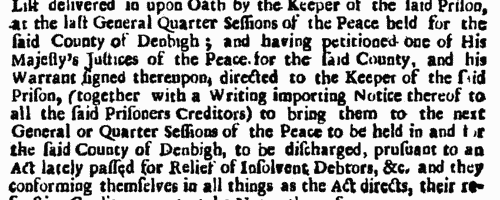Add this eBook to your basket to receive access to all 252 records. Our indexes include entries for the spelling bamber. In the period you have requested, we have the following 252 records (displaying 21 to 30): These sample scans are from the original record. You will get scans of the full pages or articles where the surname you searched for has been found. Your web browser may prevent the sample windows from opening; in this case please change your browser settings to allow pop-up windows from this site. Treasury and Customs Records
(1718)
Government accounts, with details of income and expenditure in Britain, America and the colonies
| Sample scan, click to enlarge

|  Apprentices registered at Liverpool in Lancashire
(1717-1719) Apprentices registered at Liverpool in Lancashire
(1717-1719)
Apprenticeship indentures and clerks' articles were subject to a 6d or 12d per pound stamp duty: the registers of the payments usually give the master's trade, address, and occupation, and the apprentice's father's name and address, as well as details of the date and length of the apprenticeship. There are central registers for collections of the stamp duty in London, as well as returns from collectors in the provinces. These collectors generally received duty just from their own county, but sometimes from further afield. Because of the delay before some collectors made their returns, this register includes indentures and articles from as early as 1716. (The sample entry shown on this scan is taken from a Norfolk return) | Sample scan, click to enlarge

|  Masters and Apprentices
(1719) Masters and Apprentices
(1719)
Apprenticeship indentures and clerks' articles were subject to a 6d or 12d per pound stamp duty: the registers of the payments usually give the master's trade, address, and occupation, and the apprentice's father's name and address, as well as details of the date and length of the apprenticeship. 22 June to 31 December 1719. | Sample scan, click to enlarge

|  Masters and Apprentices
(1720) Masters and Apprentices
(1720)
Apprenticeship indentures and clerks' articles were subject to a 6d or 12d per pound stamp duty: the registers of the payments usually give the master's trade, address, and occupation, and the apprentice's father's name and address, as well as details of the date and length of the apprenticeship. 5 September to 31 December 1720. | Sample scan, click to enlarge

| Prisoners for Debt in Lancaster
(1720)
Notices by persons imprisoned for debt in Chester, Durham, Exeter, Halton, Lancaster, Oxford, Richmond, Ruthin, Southampton, Whitechapel and Worcester, (5876), 9-12 August 1720, of their intention to apply for discharge, pursuant to the Act for the Relief of Insolvent Debtors. The notices give full name, previous residence, and occupation. | Sample scan, click to enlarge

| Wigan Householders: Scholes
(1720)
The poor rate assessment for Wigan is arranged by the seven divisions of the town - Hallgate, Market Street, Millgate, Scholes, Standishgate, Wallgate and Woodhouses - with an appendix of occupiers of lands. Full names are usually given, occasionally with occupation. | Sample scan, click to enlarge

|  Apprentices registered at Liverpool in Lancashire
(1719-1721) Apprentices registered at Liverpool in Lancashire
(1719-1721)
Apprenticeship indentures and clerks' articles were subject to a 6d or 12d per pound stamp duty: the registers of the payments usually give the master's trade, address, and occupation, and the apprentice's father's name and address, as well as details of the date and length of the apprenticeship. There are central registers for collections of the stamp duty in London, as well as returns from collectors in the provinces. These collectors generally received duty just from their own county, but sometimes from further afield. Because of the delay before some collectors made their returns, this register includes indentures and articles from as early as 1718. (The sample entry shown on this scan is taken from a Norfolk return) | Sample scan, click to enlarge

|  Masters of Apprentices registered at Liverpool in Lancashire
(1719-1721) Masters of Apprentices registered at Liverpool in Lancashire
(1719-1721)
Apprenticeship indentures and clerks' articles were subject to a 6d or 12d per pound stamp duty: the registers of the payments usually give the master's trade, address, and occupation, and the apprentice's father's name and address, as well as details of the date and length of the apprenticeship. There are central registers for collections of the stamp duty in London, as well as returns from collectors in the provinces. These collectors generally received duty just from their own county, but sometimes from further afield. Because of the delay before some collectors made their returns, this register includes indentures and articles from as early as 1718. (The sample entry shown on this scan is taken from a Norfolk return) | Sample scan, click to enlarge

|  Masters and Apprentices
(1723) Masters and Apprentices
(1723)
Apprenticeship indentures and clerks' articles were subject to a 6d or 12d per pound stamp duty: the registers of the payments usually give the master's trade, address, and occupation, and the apprentice's father's name and address, as well as details of the date and length of the apprenticeship. 7 January to 31 December 1723. | Sample scan, click to enlarge

|  Apprentices registered at Liverpool in Lancashire
(1728-1731) Apprentices registered at Liverpool in Lancashire
(1728-1731)
Apprenticeship indentures and clerks' articles were subject to a 6d or 12d per pound stamp duty: the registers of the payments usually give the master's trade, address, and occupation, and the apprentice's father's name and address, as well as details of the date and length of the apprenticeship. There are central registers for collections of the stamp duty in London, as well as returns from collectors in the provinces. These collectors generally received duty just from their own county, but sometimes from further afield. (The sample entry shown on this scan is taken from a Norfolk return) | Sample scan, click to enlarge

|
Research your ancestry, family history, genealogy and one-name study by direct access to original records and archives indexed by surname.
|












